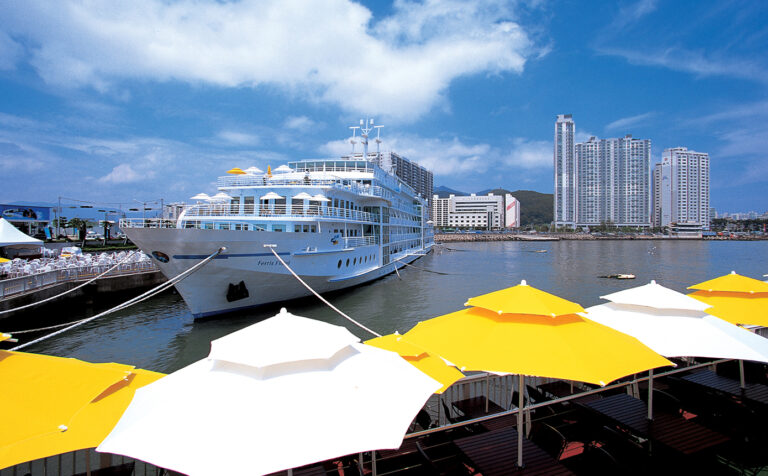Floating hotels are used as lodging establishments by fixing structures on the surface of the water. In two aspects, the ‘location’ element of the lodging product is not fully satisfied. First, the ownership of water resources such as seas, rivers, and lakes within the territory of Korea belongs to the state, so the location of floating hotels is rented rather than owned like land. Specifically, the ‘location’ of a floating hotel is secured by obtaining a ‘Public Water Surface Occupation Permit’ from the Ministry of Oceans and Fisheries. Second, although the facility is fixed in a specific location, it is not permanently fixed like a building on land. For example, the ‘Haegumgang Hotel,’ located in the ‘Kumgangsan International Tourist Zone,’ was originally built in Singapore in 1988, operated in Australia, moved to Vietnam, and finally relocated to the Kumgangsan. Therefore, floating hotel facilities have the characteristics of movable property rather than real estate.
However, in the legal context, ships contain the characteristics of both movable and immovable property. The difference between movable and immovable property under the ‘Civil Act’ lies in how property rights are effectuated. For immovable property, property rights are effectuated through ‘registration,’ while for movable property, they are effectuated through ‘delivery.’ The ‘Ship Registration Act’ allows steamships and sailing ships over 20 tons and barges over 100 tons to be registered, just like real estate. The ‘Corporate Tax Act’ defines the depreciation period as 12 years, which is between the 5 years for movable property and 20-40 years for real estate.
The floating hotel business was enacted in 1982 as marine tourist hotel business when the ‘Tourism Business Act,’ the predecessor of the ‘Tourism Promotion Act,’ was revised. The Tourism Business Act defined marine tourist hotels as a ‘business that fixes or moors marine structures or ships equipped with structures and facilities suitable for tourists’ lodging and provides food.’ The requirements for marine tourist hotels included:
- Fixing or mooring marine structures or ships equipped with structures and facilities suitable for tourists’ lodging.
- Installing bridges or having other transportation means to connect the hotel with the land for the convenience of guests.
- Having an access road that allows convenient vehicle entry to the nearby coast for hotel guests.
- Providing parking facilities nearby the coast.
- Having at least 50 rooms and a lobby.
- Ensuring that more than half of the rooms have facilities equivalent to a 3-star tourist hotel or higher.
- Meeting the facility standards of a 3-star tourist hotel or higher for amenities as specified in Annex 4.
- Having public baths equipped with toilets with flush toilets, bathtubs, showers, sinks, and mirrors on each floor with non-compliant rooms, if any, providing hot and cold water.
- Installing facilities to prevent marine pollution, such as:
- Sewage treatment facilities. (including crushing and disinfection facilities)
- Sewage storage facilities.
- Waste incineration facilities.
- Oil-water separation devices and oil discharge monitoring and control systems for marine tourist hotels generating bilge water.
In 1999, through the amendment of the Tourism Promotion Act, the marine tourist hotel business was changed to ‘floating hotel business.’ Article 2 of the current ‘Enforcement Decree of Tourism Promotion Act’ defines the floating hotel business as a ‘business that fixes or moors structures or ships on the water, providing facilities suitable for tourists’ lodging or accompanying auxiliary facilities for tourists to use.’ Annex 1 of the same act specifies the registration criteria as follows:
- The water surface where the floating hotel is located must obtain an occupation permit from the administrative authority under the ‘Public Waters Management and Reclamation Act’ or the ‘River Act.’
- Must have at least 30 guestrooms equipped with bathrooms or shower facilities.
- Must have a system in place to provide services to foreigners.
- Providing sewage storage and treatment facilities and waste disposal facilities to prevent water pollution.
- Securing ownership or usage rights of the structures and ships. However, ownership must be secured if recruiting members.
Floating hotels have not become widespread due to safety concerns, the burden of maintenance costs, and restrictions on asset disposal. In 1996, the Southeast Floating Hotel purchased a luxurious 7,800-ton cruise ship from Russia and opened ‘Ferris Flotel,’ the first floating hotel in Korea, in 2002. However, the hotel operation was suspended in 2003 when the ship capsized due to Typhoon Maemi, and it was eventually dismantled in 2005 before the Busan APEC Summit after being abandoned for some time.


